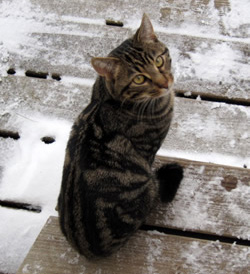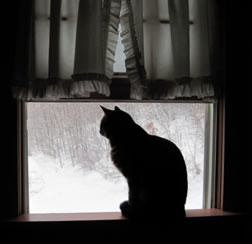Regardless who originally said or wrote that “Sometimes a cigar is just a cigar” in what context, in its most popular current usage it refers to not overlooking something’s actual identity in favor of any symbolism we choose to attach to it. As the amount and different kinds of symbolism we confer on companion animals continues to grow, the concept of “just an animal” seems to be going the way of “normal” in our society. By that I mean that in our efforts to impose all our symbolism (to say nothing of various behavioral, medical, and political labels) on animals, the population of those animals perceived as members of a different species with their own species-specific and individual needs has shrunk considerably. Because of this, when a friend sent me an article published in the New England Journal of Medicine entitled “A Day in the Life of Oscar the Cat” written by geriatrician David M. Dosa, it riveted my attention.
My first thought was to wonder how in the world I missed this when it was published more than 6 years ago. My second was to wonder how readers then and now responded or would respond to this animal’s behavior, given any preconceptions about the proper behavior of an animal living in a nursing facility where people routinely die. Unlike the stereotypic therapy cat who adores visiting ailing patients, their visitors, and staff members and cheers them with his antics or purring, Oscar ranks as the epitome of the purpose-oriented feline. No one assigned his mission to him; nobody trained him to accomplish it. Quite the contrary, Oscar exudes the aloof confidence of a barn or street cat who’s perfectly capable of getting his job done on his own, thank you very much.
So what, exactly, does this rather ordinary-looking cat do of his own volition and for his own reasons? Oscar somehow senses when a patient is going to die in the immediate future. If they’re not, he wastes no time on them. If patients rank among the living and their paraphernalia spooks him when they meet in the hall, he doesn’t hesitate to make his displeasure known in a muted, but nonetheless politically incorrect way for a therapy animal. In other words, he hisses.
When I read that, I wondered how many people would take such behavior toward patients personally. Would they think it was the cat’s duty to stop and visit everyone, thanks to all those media and other reports that condition us to believe this is what all therapy animals in such facilities do? Would they wish that someone would replace this purposeful feline with one more in keeping with their expectations?
But regardless what Oscar may be and what we may think about it, he doesn’t care. Like the person who assumes a job that the rest of society fears and opts to do it to the best of his ability, Oscar assumes the role of harbinger of death and comforter of those about to die. Every day he makes his rounds during which he assesses whatever parameters he uses to determine whether someone will survive another day. If they will, he moves on to the next patient. If not, he jumps on the bed and settles in, trusting that the next staff member or visitor will make the connection between his presence there and what lies ahead.
Thanks to Oscar’s awareness, the staff gains the time to contact family members of the impending event so they can be with their loved ones when death arrives. If the patient has no family, Oscar fills the void. Thanks to Oscar, nobody on the floor where he works dies alone.
Think about that. All over the world there are loved and unloved people dying alone in medical facilities of one kind of another. In cases where death may comprise a slow process that drags on for months or years such as in the advanced dementia unit where Oscar lives, even the most devoted family members can’t be with their loved ones all the time. And for sure, overseeing their patients’ transition from life to death is not a responsibility that many in the medical professions actively seek to embrace for any one of a number of valid and not so valid reasons.
When I read about Oscar, I also thought about all those people who still believe that animals in human healthcare facilities offer nothing beyond possibly serving as carriers of parasites or diseases. It seems a given that these folks would not like a self-contained creature like Oscar. Nor would those who don’t like cats, period, for any one of a list of real or imagined reasons. Then there would be those who would feel compelled for yet other reasons to prove that his behavior represented nothing more than a statistical anomaly, the result of mere chance, or perhaps some sort of shared group delusion. When we add the people who see animals as an asset in a healthcare environment and who like cats, but only those cats who behave in a way they think that therapy cats should behave, theoretically the number of Oscar supporters would seem to be quite small. But that doesn’t appear to be the case.
Perhaps it isn’t the case because the idea of dying alone in some long-term care facility forgotten by or separated from friends and loved ones heads the list of more than a few people’s most terrifying fears. So terrifying we don’t even want to think about it, especially as we get older. But in the dark corners of our minds where we relegate such fears, surely it’s comforting to know that somewhere somehow an Oscar exists who doesn’t give a damn what people or probability theory or modern science thinks about his ability to know when we need him to ease the life-death transition. And when we do he (or she) will be there for us too.
Returning to the original theme that sometimes a cigar is just a cigar or, in this case, sometimes a cat is just a cat: What if what makes Oscar so good at what he does is because he doesn’t care what we think about what he does, or even if he does what we think he does? What if he does it simply because something about doing it benefits him more than it costs him? What if he does it simply because that’s what cats do when we get out of the way and let them do it?
Most likely this represents a minority opinion. Still, that doesn’t change the fact that in my decades of exploring the different ways the human-animal bond manifests, a recurrent theme involves cats and human death. Sometimes the connection is good and other times not-so-good. Nonetheless it persists and often possesses an ethereal connotation that doesn’t seem to occur nearly so often when human death involves members of other species. Perhaps this occurs because for centuries we’ve assigned cats an otherworldly quality that we’ve assigned to members of no other domestic species. Perhaps those who first did this way back when did so because they had some pretty compelling reasons to do so.
Lots of questions, few answers.
 Over the years I’ve shared my life with multiple cats and relished the attention of those who made me feel like the sun rose and set on my head, that they’d die without my magnificent presence in their lives. But reading about Oscar caused me to consider the current feline resident, the emotionally elusive Bamboo, in a new light. If I succumb to a miserable cold or sustain some physical injury that leaves me hobbling around, he’ll find his empty food dish no less inexcusable than when I experience the peak of physical health. If I choose to throw a hissy fit, dissolve in a puddle of tears or surrender to a woe-is-me pity-party, he responds by standing at the door wearing a contemptuous expression and emitting “Open the door so I can get away from you!” screams. Definitely not the kind of cat to support drama queen behaviors or any other delusions of grandeur. If the day ever comes that I need to use a cane or a walker or some other implement to ease my life, the most I’d expect from him would be tolerance, and grudging tolerance at that. However, an occasional hiss or swat from him wouldn’t surprise me in the least.
Over the years I’ve shared my life with multiple cats and relished the attention of those who made me feel like the sun rose and set on my head, that they’d die without my magnificent presence in their lives. But reading about Oscar caused me to consider the current feline resident, the emotionally elusive Bamboo, in a new light. If I succumb to a miserable cold or sustain some physical injury that leaves me hobbling around, he’ll find his empty food dish no less inexcusable than when I experience the peak of physical health. If I choose to throw a hissy fit, dissolve in a puddle of tears or surrender to a woe-is-me pity-party, he responds by standing at the door wearing a contemptuous expression and emitting “Open the door so I can get away from you!” screams. Definitely not the kind of cat to support drama queen behaviors or any other delusions of grandeur. If the day ever comes that I need to use a cane or a walker or some other implement to ease my life, the most I’d expect from him would be tolerance, and grudging tolerance at that. However, an occasional hiss or swat from him wouldn’t surprise me in the least.
 At the same time though, there’s something about this cat who can take or leave me on any given day that makes me think that, if he were around when I made that final journey, he’d step up the plate… And for that I’m very thankful.
At the same time though, there’s something about this cat who can take or leave me on any given day that makes me think that, if he were around when I made that final journey, he’d step up the plate… And for that I’m very thankful.
To read a more personal account of Dr. Dosa’s experiences with Oscar, Making Rounds with Oscar is your best source and would make a wonderful holiday gift. And if you wonder what Oscar is up to now, you can learn more about this extraordinary ordinary cat here.
Milk is actually bad for your cats! Just sayin! It can cause alot of pemolrbs for them. Never give cats regular milk only the milk replacer as babies who don’t have moms or moms can not care for them properly. Otherwise all was funny. I love my cats!
Not necessarily. Although many cats do have problems with it and other dairy products, there are those who don’t. The experience I get, the more leery I am about taking a one-size-fits-all-approach.